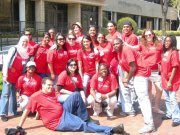This Land Was Made for You & Me
I am a little sad, and kind of in shock right now. I spent the day visiting a Navajo reservation on the border of Arizona and New Mexico. This was my first time spending any meaningful time on Native American lands. Even though it was a relatively quick visit, I found it very eye opening.
Approaching the reservation, I noticed multiple things. First and foremost, since I was actually pretty darn hungry- I noticed the food options available. Almost nothing but fast food or commercial dine in restaurants (Pizza hut, sizzlers, etc.) for almost a solid fifty mile radius (if not, more). I saw one non-main stream grocery store- but only one, for quite a large area of land.
Another thing you see a TON of, is ‘No Drinking and Driving’ signs. I am not talking about your normal one or two signs every so often. I am talking one almost every mile or two, in various different forms of messaging, indicating that perhaps this was a serious problem here. I also saw other sign, including various postings talking about the lack of job opportunities for Navajo people.
Later, we actually got lost on our way to the hospital we were visiting and ended up in a housing development. The housing development literally seemed half finished. There were some paved roads, but many were just super bumpy, rugged dirt roads. The homes looked pretty uniform in size and layout, some seem unfinished with visible remnants of construction still present- but all seemed occupied regardless of their stage of completion.
When we got to the hospital, the first thing I noticed- I also noticed this at lunch (we stopped at a local Denny’s), was that almost everyone was overweight. And I don’t say this to be rude or insensitive, but unfortunately after years of working as a nurse- I know it was the kind of extra weight that usually means heart disease, diabetes, and early mortality are associated with it. And seeing how things were so spread out and very rural, I couldn’t help but wonder what type of access to care this population had, if any!
When we sat down with the Nursing management team, we learned even more. Many of the people didn’t have access to running water and subsequently could not bath frequently (leading to more infections and other medical complications). They even said the water was shut down in the hospital for a day last week!!! They resigned to using cat litter in bed pans to dispose of the body fluid safely!! Crazy!!! They further explained that many places had spotty electricity. They talked about some of the health problems that plague their patients- for example, the high number of patients on dialysis, alcoholism, and diabetes.
To be honest, I am not sure why I was shocked by all of this. I knew Native American populations were underserved and faced many challenges. But to be honest, seeing it versus reading/hearing about it really made it so much realer. You see these conditions in third world countries, but I honestly didn’t think these conditions existed in our country!
I was motivated to look up some statistics following what I saw and heard, and this is some of the data I found:
Median household income: $20,005
Unemployment: 42%
Poverty: 43%
Education: 56% HS degree
7% college degree
I found this data on the Navajobusiness.com website. I am not sure how old the data is, might be from circa 2003- so definitely a little dated. But I promise you, what I saw, seems to align with these statistics. A 2016 article in www.AZcentral.com confirms all these figures, and furthermore outlines the dire living conditions many of the Navajo peoples are living in. “Fewer than half of all homes have finished bathrooms or kitchens. More than one third have no electricity”, the article states. It further explains, “In far flung tribal communities, scattered across mesas and prairies, thousands of Navajos haul water to hand to houses where they keep warm beside stoves.”
No running water, barely working electricity, broken down homes, no means of employment… is this what we have to offer in reparations? Is this the best we can do? In my opinion, I don’t think we have done right by our predecessors, but I also don’t think it is too late. I am not going to pretend to know the answers to this complicated and nuanced situation I just encountered, but I one hundred percent know- The United States of America, one of the greatest countries in the world, could and should make sure everyone of its citizens are granted a quality of life beyond the measures that have been afforded to our Native American brothers.
Afterall…
“This land is your land, this land is my land… This land was made for you and me”


Comments
Post a Comment